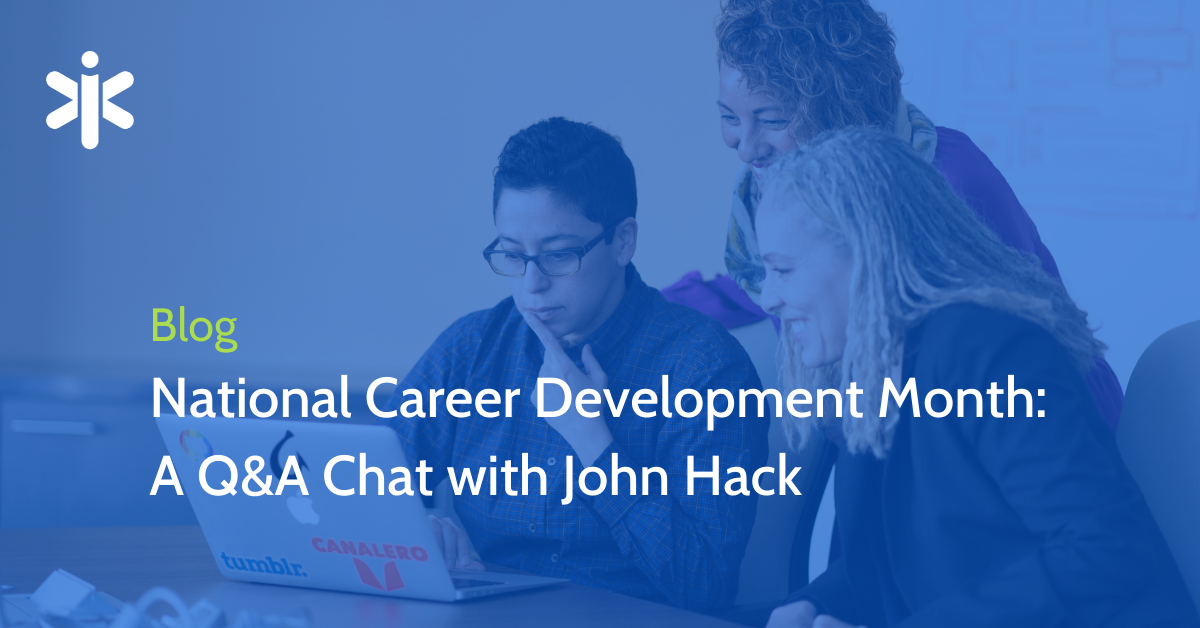November is recognized as National Career Development Month by the National Career Development Association (NCDA). In recognition of the observance, John Hack, Chief Technology Officer and Co-founder, delves into his career journey story and shares career guidance.
1. What has your career path been?
I’ve pivoted a few times. When I first went to MIT, I wanted to be an economics professor. However, after becoming disillusioned with the field, I took some time off from school. At first, I managed cafeteria workers. Then, I was a programmer in Wang Lab’s Natural Language Processing R&D group.
During these early days of spelling and grammar checking, we were working on helping people write better. The work was rewarding to me. I was building things, and it turned out that technology could help people.
After my time as a programmer, I spent six years developing trading systems for financial institutions. While this was a bit off the path, I learned a lot about how companies work and how analytics are used in organizations. Soon after, I earned my master’s degree in technology management and began my career as internet consultant at the height of the dotcom boom.
After the dotcom crash, I consulted a startup that focused on sales performance analytics. Then, I joined another early-stage company selling corporate performance management software. We were acquired by SAP, where I ran the performance management innovations lab for about 7 years. It was apparent that the roots of performance were people: their abilities, how they’re organized, and how well they’re led.
After a couple years doing innovation lab work, a longtime colleague (John Muldoon!) and I were looking at the corporate training market. We realized that Natural Language Processing and Interactive UX had reached an inflection point, and that AI could be an effective tool to help people develop their interpersonal skills.
So, we started a company to do that.
2. What attracted you to a field to help people find ways to improve their careers?
I come from a family of teachers and married into a family of teachers, so education has always been part of my life. In many ways, I’ve always been helping others improve. Back in college, when I took over managing the cafeteria, one of the first things I did was create a manual and formalized staff training. Not only was the cafeteria cleaner and better run, but my job was easier when the staff was well-trained. In my startup days, I’d have to write the user manuals for the software I was building. I cannot recommend enough the value of starting any software project with the user manual.
Professional development was also a personal goal. At every stage of my career, learning new things took me to a new level. Unfortunately, the things I didn’t know held me back. I still learn new things every day. Essentially, I want to help others move to their new levels more quickly than I did.
3. What words of advice would you give to someone early in their career?
I’d give two words of advice. First, find people outside your company that share your interests. Go to the meetups, professional conferences, and join groups both online and in person. Second, Experiment. You should try different things, work at different companies, join a startup, or do volunteer work. Most successful people, from Steve Jobs to Leonardo Da Vinci, were cross-disciplinary thinkers.
4. In your opinion, what are the most important skills to concentrate to advance careers?
People First: Your ability to collaborate, lead, follow, and influence will differentiate you. Second, you must cultivate the ability to learn new things quickly. The world is changing, faster than ever, and any specific technical skills will become obsolete. If you develop your interpersonal skills and make sure you can learn new technical skills quickly, you’ll be in the best position to ride the waves of change.
5. What’s the best advice you can give to help plan a career rather than simply work to keep a job?
Don’t plan your career. Start with your life goals: Family or not? Where do you want to live? What work do you enjoy? Is there a way to combine these successfully? If not, what tradeoffs are you willing to make? Then give it a go. It won’t work out like you planned. You’ll have setbacks and successes. You’ll change. Your goals will change. It’s more like navigating with a compass than with map. Every few years, make sure you reevaluate where you are and where you’d like to be, and continue moving in the direction you want to be.
